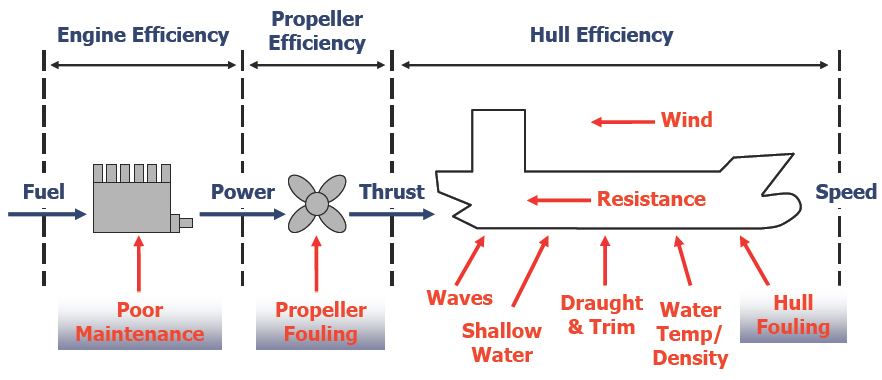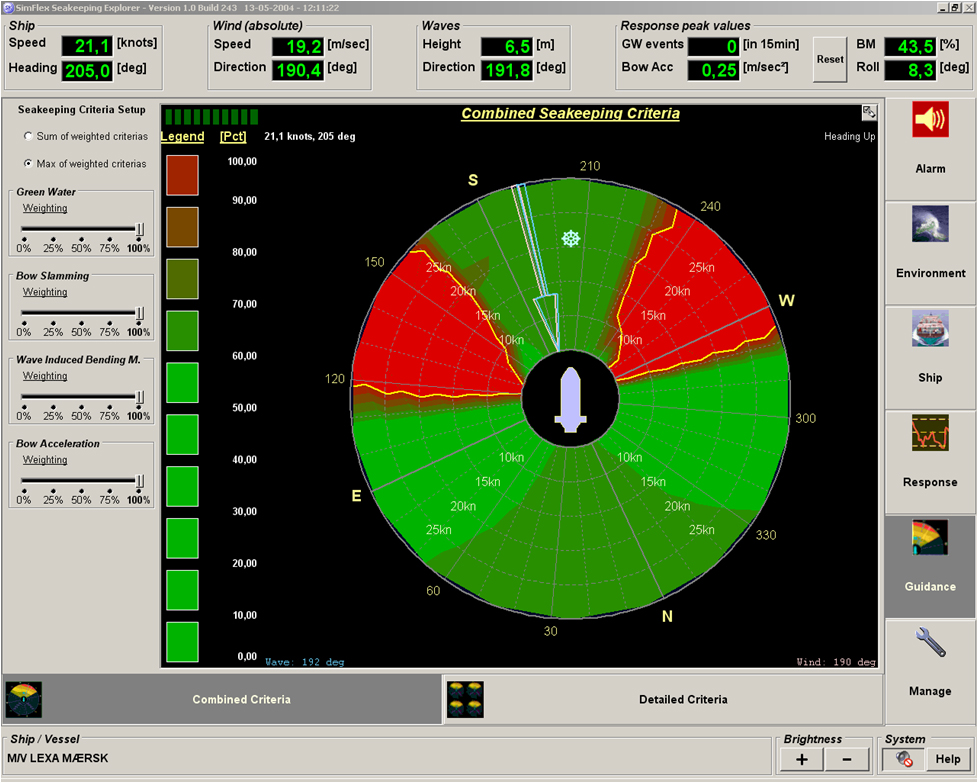
Today, more than 90% of the world’s freight is transported by ship. Although shipping is already a climate-friendly mode of transportation, there is great potential in researching and developing technology that reduces the overall amount of CO2 emissions.
Research in developing and improving ships’ engines, hulls, propellers and sailing characteristics gives great benefits for both shipowners and the world’s population. Today, fuel costs amount to almost half of a ship’s overall running costs. Therefore there is a considerable economic motivation for ship owners to increase their vessels’ energy efficiency – in addition to environmental and climate-related motivations.
For example, the oil used around the globe to propel ships is estimated at about 5% of the world’s total oil consumption – in comparison, Denmark uses only about 0.2% for production, heating, transportation etc! At today’s oil price, the annual fuel costs for a large container ship amount to about DKr 100 million Quite small changes in, for example, planning the correct sailing route, reducing fouling on the hull or propeller, or changing how the ship is loaded can therefore give large reductions in CO2 emissions and fuel consumption. Moderate fouling of a ship’s hull or propeller can, for example, result in more than 3% greater oil consumption.
FORCE Technology and the Department of Mechanical Engineering at the Technical University of Denmark (DTU Mechanical Engineering) established the Danish Centre for Maritime Technology (DCMT) in 2006 with a grant from the Danish Maritime Fund. The centre is aimed at strengthening research, development and innovation in maritime technology. DTU Mechanical Engineering is responsible for the longer-lasting research-related activities, while FORCE Technology ensures that the results can be commercialised. In this way, DCMT acts as a catalyst between the academic world and the maritime business world.
As a result of this collaboration, several research projects have been launched at DTU Mechanical Engineering. Some of the projects are described briefly below.
Monitoring ship performance
The purpose is to develop advanced methods for analyzing ship performance data. The methods are based on advanced statistical methods and pattern recognition.

It is possible to predict the propulsion power with a relative error of less than 2.7% using a single hidden layer neural network, while classical methods have a relative error of more than 5%. The prediction was carried out for four different states with the following input variables: ship speed, relative wind speed and direction, air temperature and sea water temperature. PhD student Benjamin Pjedsted Pedersen
Propeller cavitation modelling using CFD
The purpose is to implement and validate a cavitation model in DTU EllipSys CFD Code. This will be the basis for using CFD in developing high-efficiency propellers, taking into account cavitation, inhomogeneous inflow behind the ship and ship propeller interaction. PhD student Keun Woo Shin
The 2-stroke diesel engine scavenging process
The purpose is to develop an experimentally verified numerical model of the scavenging process in a large MAN Diesel two-stroke diesel engine. Modelling of the scavenging process enables a better understanding of the combustion process, energy losses and the emission formation inside the engine cylinder. PhD student Sajad Haider
Onboard decision support systems
The purpose is to further develop the methods used by SeaSense for decision support systems applied in heavy weather. The development includes fault detection in monitoring systems and improved wave estimation algorithms. PhD student Zoran Lajic

Decision support with regards to speed and course relative to encountered waves.
Added resistance in waves
The purpose is to develop efficient numerical tools for calculating second-order wave-induced forces and moments and hence added resistance in waves. PhD student Soizic Annick Gabrielle Deschamps
Unconventional prime movers
The purpose is to assess alternatives to the two-stroke diesel engine as prime mover for large ships and study them from a systems perspective. PostDoc Fredrik Haglind
Dynamic stability
The purpose is to develop methods for improved prediction of parametric roll and related roll motions. Thereby, better operation guidance can be given in onboard decision support systems. PostDoc Jelena Vidic-Perunovic